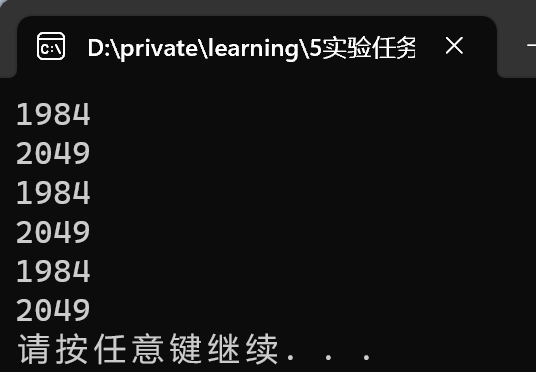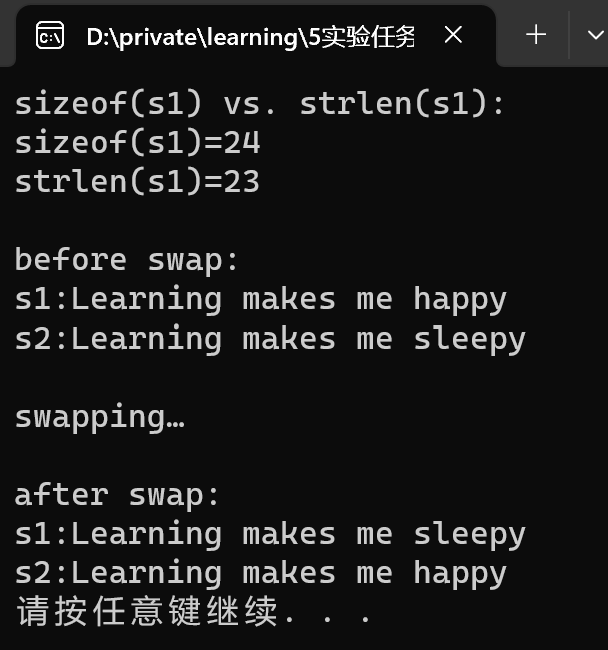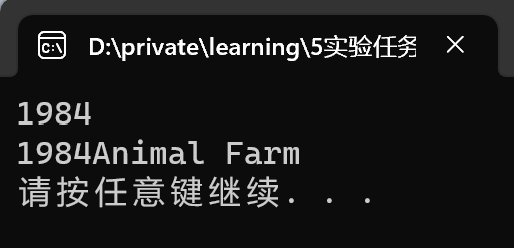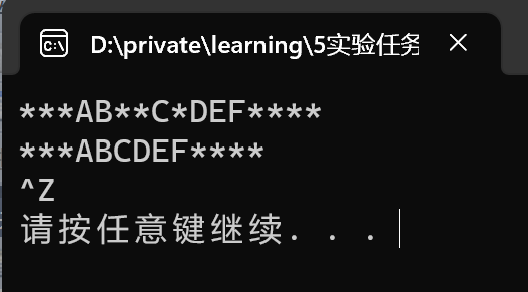实验5
实验任务1
task1_1
程序代码:
#include <stdio.h> #include <stdlib.h> #define N 4 int main(){ int x[N]={1,9,8,4}; int i; int *p; for(i=0;i<N;++i) printf("%d",x[i]); printf("\n"); for(p=x;p<x+N;++p) printf("%d",*p); printf("\n"); p=x; for(i=0;i<N;++i) printf("%d",*(p+i)); printf("\n"); p=x; for(i=0;i<N;++i) printf("%d",p[i]); printf("\n"); system("pause"); return 0; }
运行结果:

task1_2
程序代码:
#include <stdio.h> #include <stdlib.h> int main(){ int x[2][4]={{1,9,8,4},{2,0,4,9}}; int i,j; int *p; int (*q)[4]; for(i=0;i<2;++i){ for(j=0;j<4;++j) printf("%d",x[i][j]); printf("\n"); } for(p=&x[0][0],i=0;p<&x[0][0]+8;++p,++i){ printf("%d",*p); if((i+1)%4==0) printf("\n"); } for(q=x;q<x+2;++q){ for(j=0;j<4;++j) printf("%d",*(*q+j)); printf("\n"); } system("pause"); return 0; }
运行结果:

实验任务2
task2_1
程序代码:
#include <stdio.h> #include <stdlib.h> #include <string.h> #define N 80 int main(){ char s1[]="Learning makes me happy"; char s2[]="Learning makes me sleepy"; char tmp[N]; printf("sizeof(s1) vs. strlen(s1):\n"); printf("sizeof(s1)=%d\n",sizeof(s1)); printf("strlen(s1)=%d\n",strlen(s1)); printf("\nbefore swap:\n"); printf("s1:%s\n",s1); printf("s2:%s\n",s2); printf("\nswapping…\n"); strcpy(tmp,s1); strcpy(s1,s2); strcpy(s2,tmp); printf("\nafter swap:\n"); printf("s1:%s\n",s1); printf("s2:%s\n",s2); system("pause"); return 0; }
运行结果:


回答:
24;文本占用空间的大小;文本长度;
不能,s1表示的是s1[0]的地址,是一个常量,不能被赋值;
是;
task2_2
程序代码:
#include <stdio.h> #include <stdlib.h> #include <string.h> #define N 80 int main(){ char *s1="Learing makes me happy"; char *s2="Learing makes me sleepy"; char *tmp; printf("sizeof(s1) vs. strlen(s1):\n"); printf("sizeof(s1)=%d\n",sizeof(s1)); printf("strlen(s1)=%d\n",strlen(s1)); printf("\nbefore swap:\n"); printf("s1:%s\n",s1); printf("s2:%s\n",s2); printf("\nswapping…\n"); tmp=s1; s1=s2; s2=tmp; printf("\nafter swap:\n"); printf("s1:%s\n",s1); printf("s2:%s\n",s2); system("pause"); return 0; }
运行结果:

回答:
地址码;该地址码内容占据大小;文本的大小;
能;
交换的是地址码;
实验任务3
程序代码:
#include <stdio.h> #include <stdlib.h> void str_cpy(char *target,const char *source); void str_cat(char *str1,char *str2); int main(){ char s1[80],s2[20]="1984"; str_cpy(s1,s2); puts(s1); str_cat(s1,"Animal Farm"); puts(s1); system("pause"); return 0; } void str_cpy(char *target,const char *source){ while (*target++=*source++) ; } void str_cat(char *str1,char *str2){ while(*str1) str1++; while(*str1++=*str2++) ; }
运行结果:

实验任务4
程序代码:
#include <stdio.h> #include <stdlib.h> #define N 80; int func(char *); int main(){ char str[80]; while(gets(str)!=NULL){ if (func(str)) printf("yes\n"); else printf("no\n"); } system("pause"); return 0; } int func(char *str){ char *begin,*end; begin=end=str; while(*end) end++; end--; while(begin<end){ if(*begin!=*end) return 0; else{ begin++; end--; } } return 1; }
运行结果:

实验任务5
程序代码:
#include <stdio.h> #include <stdlib.h> #define N 80 void func(char *); int main(){ char s[N]; while(scanf("%s",s)!=EOF){ func(s); puts(s); } system("pause"); return 0; } void func(char *str){ int i; char *p1,*p2,*p; p1=str; while(*p1=='*') p1++; p2=str; while(*p2) p2++; p2--; while(*p2=='*') p2--; p=str; i=0; while(p<p1){ str[i]=*p; p++; i++; } while(p<=p2){ if(*p!='*'){ str[i]=*p; i++; } p++; } while(*p!='\0'){ str[i]=*p; p++; i++; } str[i]='\0'; }
运行结果:

实验任务6
task6_1
程序代码:
#include <stdio.h> #include <stdlib.h> #include <string.h> void sort(char *name[],int n); int main(){ char *course[4]={"C Program","C++ Object Oriented Program","Operating System", "Data Structure and Algorithms"}; int i; sort(course,4); for(i=0;i<4;i++) printf("%s\n",course[i]); system("pause"); return 0; } void sort(char *name[],int n){ int i,j; char *tmp; for(i=0;i<n-1;++i) for(j=0;j<n-1-i;++j) if(strcmp(name[j],name[j+1])>0) { tmp=name[j]; name[j]=name[j+1]; name[j+1]=tmp; } }
运行结果:

task6_2
程序代码:
#include <stdio.h> #include <stdlib.h> #include <string.h> void sort(char *name[],int n); int main(){ char *course[4]={"C Program","C++ Object Oriented Program","Operating System", "Data Structure and Algorithms"}; int i; sort(course,4); for(i=0;i<4;i++) printf("%s\n",course[i]); system("pause"); return 0; } void sort(char *name[],int n){ int i,j,k; char *tmp; for(i=0;i<n-1;i++){ k=i; for(j=i+1;j<n;j++) if(strcmp(name[j],name[k])<0) k=j; if(k!=i) { tmp=name[i]; name[i]=name[k]; name[k]=tmp; } } }
运行结果:

回答:
变换的是指针变量的值
实验任务7
程序代码:
#include <stdio.h> #include <stdlib.h> #include <string.h> #define N 5 int check_id(char *str); int main(){ char *pid[N]={"31010120000721656X", "330106199609203301", "53010220051126571", "510104199211197977", "53010220051126133Y"}; int i; for(i=0;i<N;++i) if(check_id(pid[i])) printf("%s\tTure\n",pid[i]); else printf("%s\tFalse\n",pid[i]); system("pause"); return 0; } int check_id(char *str){ int n,j,k; char bj[]="1234567890X"; for(n=0;(str[n])!='\0';n++) ; j=0; for(k=0;k<=10;k++){ if(str[n-1]==bj[k]) j=1; } if((j==1)&&(n==18)) return 1; else return 0; }
运行结果:

实验任务8
程序代码:
#include <stdio.h> #include <stdlib.h> #define N 80 void encoder(char *s); void decoder(char *s); int main(){ char words[N]; printf("输入英文文本:"); while(gets(words)!=NULL){ printf("编码后的英文文本:"); encoder(words); printf("%s\n",words); printf("对编码后的英文文本解码:"); decoder(words); printf("%s\n",words); printf("输入英文文本:"); } system("pause"); return 0; } void encoder(char *s){ int i,j; for(i=0;s[i]!='\0';i++) ; i--; for(j=0;j<=i;j++){ if(((s[j]>=65)&&(s[j]<=89))||((s[j]>=97)&&(s[j]<=121))) s[j]=s[j]+1; else{ if(s[j]==90) s[j]=65; else{ if(s[j]==122) s[j]=97; else ; } } } } void decoder(char *s){ int i,j; for(i=0;s[i]!='\0';i++) ; i--; for(j=0;j<=i;j++){ if(((s[j]>=66)&&(s[j]<=90))||((s[j]>=98)&&(s[j]<=122))) s[j]=s[j]-1; else{ if(s[j]==65) s[j]=90; else{ if(s[j]==97) s[j]=122; else ; } } } }
运行结果:




 浙公网安备 33010602011771号
浙公网安备 33010602011771号